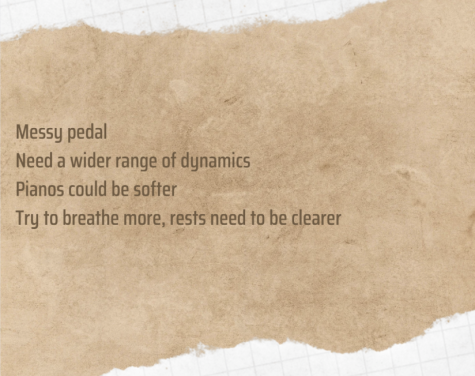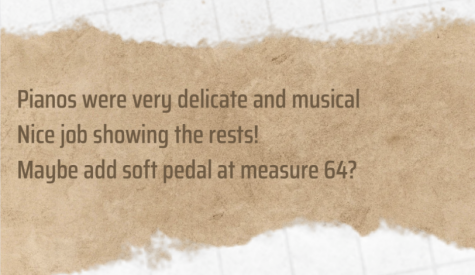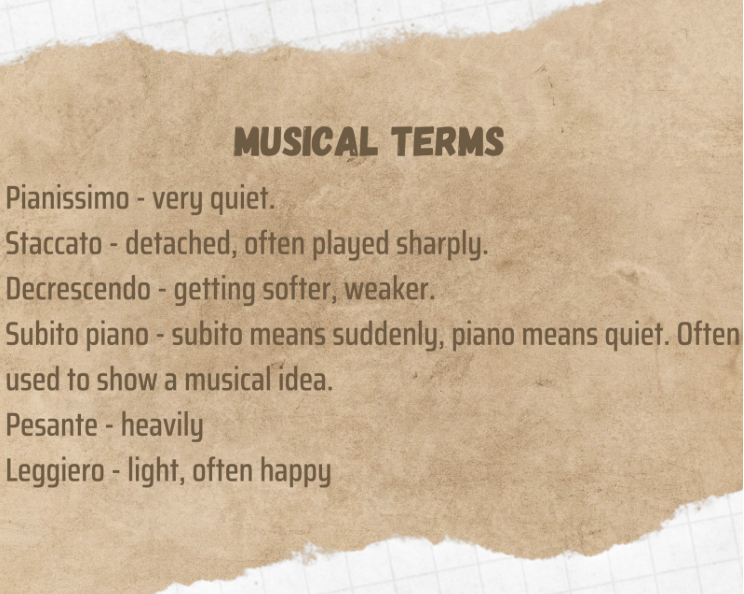The keys to passion
My experience with burnout
Some musical terms and their meanings | Graphic by Anika Bhandarkar
November 5, 2022
I’ve been playing piano since I was five and a half. Over 3,500 hours of my life have been dedicated to piano — running through scales, technique exercises and pieces. A couple of years into my piano journey, I became obsessed. I was constantly tapping my foot to a beat only I could hear and humming tunes out loud until the woven strings of melodies wound tight around my life.
Towards the middle of quarantine, however, I found my passion weakening until the melodies that once played in my head were now just a faint pianissimo tune. Every time I told myself that it was time to practice, I had to force my fingers to move across the keys even though it felt like there were lead weights dragging down on them
These forced practice sessions did more damage than good. I felt the quality of my practice worsening — every time I messed up, I felt my heart rate quicken into a pounding, insistent staccato as I got increasingly frustrated. My practice sessions got shorter, and I became more disappointed with myself. The quality of my piano classes began to deteriorate as well. I couldn’t help but notice how my piano teacher inhaled deeply and exhaled loudly after I finished playing a section — she was disappointed in me.
I was disappointed in myself too — disappointed that I couldn’t force myself to practice for longer. Every bad lesson intensified my stress, and the moment a class ended I felt my passion weaken, another step in the gradual decrescendo of ambition I was experiencing.
Soon enough, a huge competition I was competing in, with people from all over the state in attendance began to approach rapidly. I had to do well. I found myself putting more and more pressure on myself to do better, desperately trying to make up for several months of poor practice in two weeks.
The day of my competition, I walked out of the alcove trying to calm my racing heart as I presented my music to three smiling judges. After another deep breath, I walked to the piano, sat down and started playing with my heart still hammering.
The first powerful chord washed over me like a wave, pulling me underneath the spell of the piece until I was lost in the music. The rest of the performance was a blur. I only remember stopping once between my two pieces, briefly resurfacing to take a breath, then sinking back into the spell of the music as I started my second piece. When I returned to reality the second time, I stood up from the bench and bowed, my heart still pounding. I wore a much more assured smile on my face as I walked to the judges’ table and grabbed my books, walking out of the hall much more relaxed than I was 15 minutes prior.
I think I did well …
All too soon, two weeks had passed and I was opening the email with my results. I scrolled to the end, hastily clicking on the file with my results and comments and started reading them with a smile on my face.

My smile was gone. These weren’t just small fixes — these were major structural issues I’d been trying to fix for months. I fought back tears threatening to fall as I stared at the screen. This wouldn’t have happened if I had practiced better. This could have been prevented. Thirty minutes later, I had made a resolution. I would ramp up the practice and train harder than I ever had before.
However, my exhaustion remained, and I began to wonder: Why am I even doing this if I can’t make myself practice?
A pause. A sudden halt. Subito piano — suddenly quiet, a new beginning.
Why am I doing this?
Days later, I was still lost. Forcing myself to practice was only making me more burnt out, but I had a competition three weeks away that I needed to prepare for. On one hand, I knew it would be risky to take time off because then I’d only have a week or two to prepare for the competition, but grinding away every day wasn’t helping me either.
Ultimately, I decided to take two weeks off, and they turned out to be some of the most important ones of my life. I prioritized self-care for the first time in a while — taking time to run, play with my dogs, hang out with my friends — and finally, I felt like I was in control of my life. Taking time off improved my mental health more than telling myself to work harder ever could. Over those two weeks, I realized that there was a point in my piano journey when I really needed to take a break, a point where my self-control could only take me so far, and unfortunately, I had crossed that line by a mile. Taking regular breaks to preserve my mental health and focusing on doing other things that made me happy became a central part of my life after that.

Two weeks later, I returned to piano. I worked harder than I ever had in the week leading up to the competition, and when I performed, I was confident in myself. I could feel myself thinking about the music, remembering all the rests and all the pianos and all the moments that were supposed to sparkle like stars. I left the competition with a radiant smile on my face, my mind no longer caught up in the heavy pesante of negative thoughts, feeling almost leggiero — light.
When the results came in, the smile never left my face as I read the comments, and I’m proud to say that I gained a shining trophy in addition to a newfound love for piano.


















